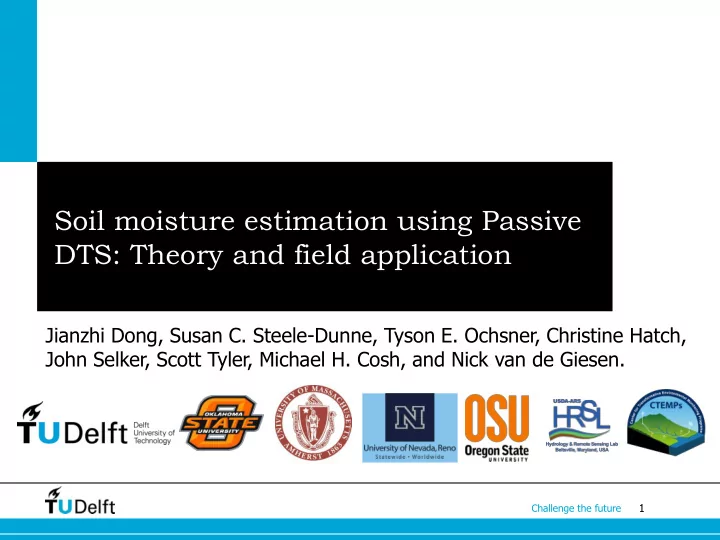

Soil moisture estimation using Passive DTS: Theory and field application Jianzhi Dong, Susan C. Steele-Dunne, Tyson E. Ochsner, Christine Hatch, John Selker, Scott Tyler, Michael H. Cosh, and Nick van de Giesen. 1 Challenge the future
Content • Background DTS and soil moisture Key challenges in Passive DTS • Improved Passive DTS • Data assimilation in Passive DTS • Conclusion and future work 2 Challenge the future
Background Distributed temperature sensing (DTS) Temporal resolution: < 1min Spatial resolution: < 1m Stokes Anti-Stokes Light Pulse ~5 cm ~10 cm ~15 cm 3 Challenge the future
Background Distributed temperature sensing (DTS) Temporal resolution: < 1min Spatial resolution: < 1m Stokes Anti-Stokes Light Pulse ~5 cm ~10 cm ~15 cm 4 Challenge the future
Background Passive DTS • Soil heat transfer depends on soil moisture • Soil moisture determines soil thermal property 5 Challenge the future
Background Passive DTS • Steele-Dunne et al (2009): Use T observation at 3 depths -> diffusivity -> moisture • Challenges: Two soil moisture might be retrieved Very sensitive with cable separation distances Assume moisture/thermal property profile is uniform z12 z13 6 Challenge the future
Content • Background • Improved Passive DTS Soil moisture selection Estimating cable separation distances Including soil thermal property profile • Data assimilation in Passive DTS • Conclusion and future work 7 Challenge the future
Improved Passive DTS Selecting “correct” soil moisture estimates J. Dong et al., submitted to WRR 8 Challenge the future
Improved Passive DTS Cable separation distance estimation Use temperature amplitude analysis to determine cable separation distance: Estimated cable separation Estimated cable separation distance in distance, synthetic experiment. real cable data a long a 61m transect. J. Dong et al., submitted to WRR 9 Challenge the future
Improved Passive DTS Importance of considering verticle heterogeneity soil profile Synthetic Experiment a b J. Dong et al., submitted to WRR 10 Challenge the future
Improved Passive DTS Impact of soil texture uncertainty on estimated diffusivity (Synthetic experiment) J. Dong et al., submitted to WRR 11 Challenge the future
Improved Passive DTS Estimated diffusivity and soil moisture anomalies at SMAP MOISST Gray line/dots: soil diffusivity/moisture anomaly at each meter of cable Black circle: median 12 Challenge the future
Content • Background • Improved Passive DTS • Data assimilation in Passive DTS • Conclusion and future work 13 Challenge the future
Data assimilation & DTS Ensemble Kalman Filter (EnKF) a Y t ( ) Y t ( ) K t T ( )( T ) obs f 1 K t C C R ( ) YM M e 14 Challenge the future
Data assimilation & DTS Ensemble Kalman Filter (EnKF): Soil Moisture Profile 15 Challenge the future
Data assimilation & DTS Using data assimilation to design DTS experiments RMSE in Soil Moisture Estimates RMSE (m 3 /m 3 ) RMSE (m 3 /m 3 ) 16 Challenge the future
Content • Background • Improved Passive DTS • Data assimilation in Passive DTS • Conclusion and future work 17 Challenge the future
Conclusions and future work • We improved Passive DTS, and tested it using real and synthetic DTS data. Non-unique soil moisture estimates is distinguished using a simple method Cable separation distance can be estimated using amplitude analysis Including soil thermal property profile information improves moisture estimates • We demonstrated data assimilation might be useful for Passive DTS Improves entire profile Stable and capable to account for large uncertainties. • We will test and apply DA approach in real data. 18 Challenge the future
Thank you! 19 Challenge the future
Recommend
More recommend